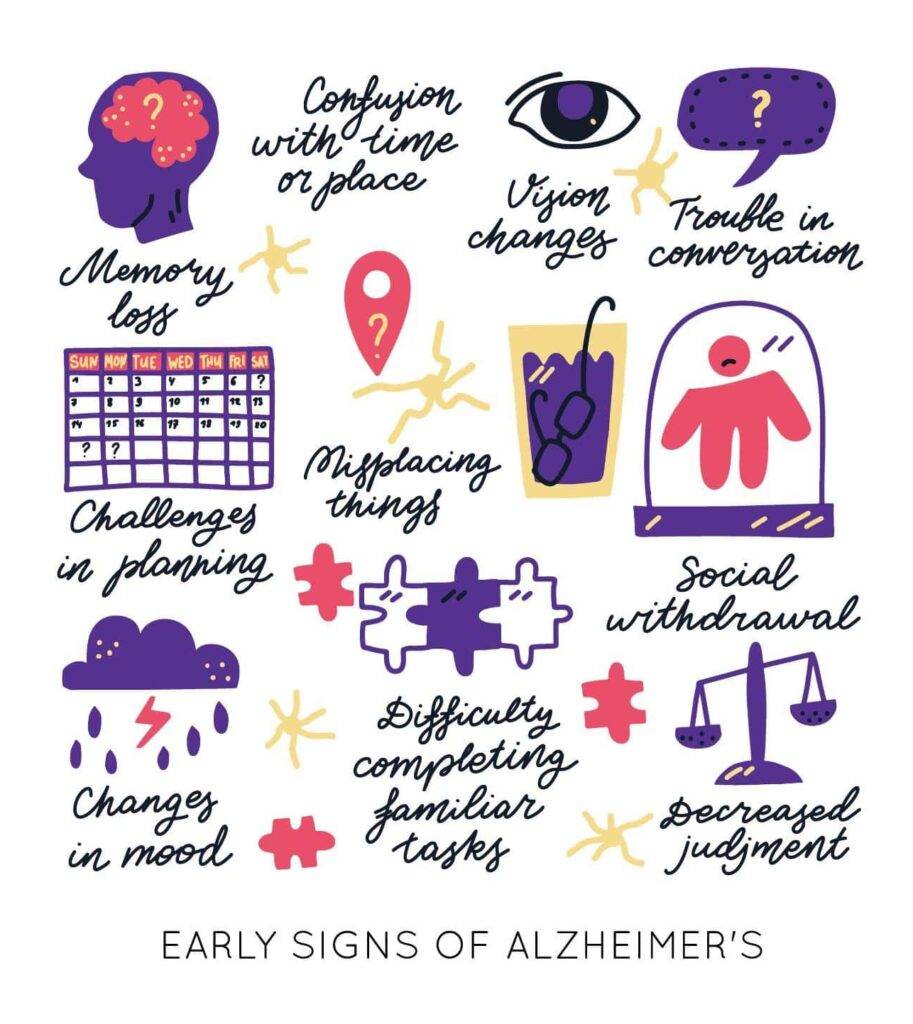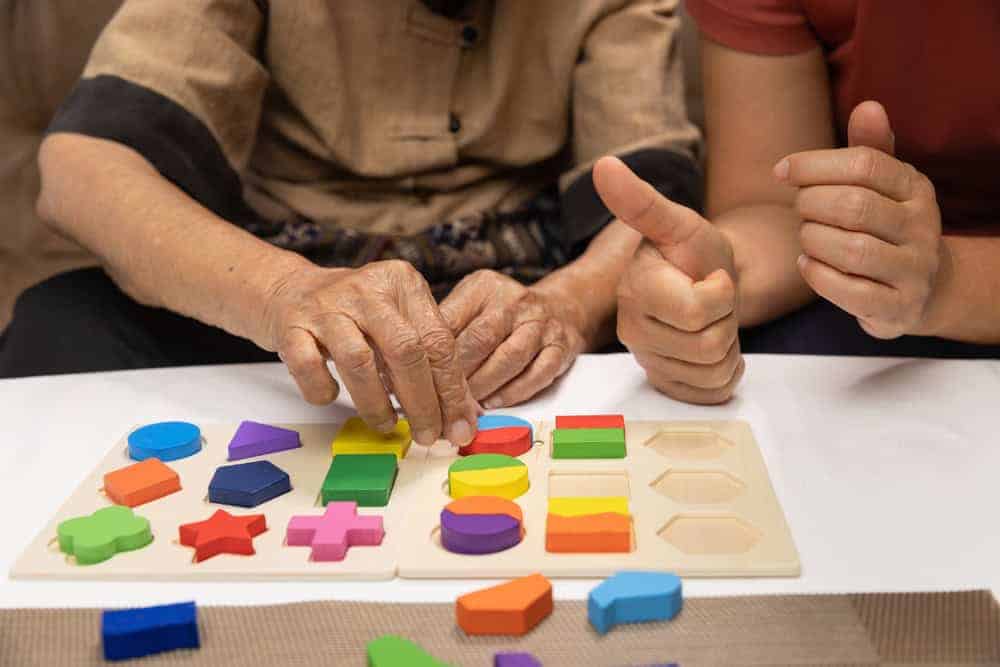Do you feel like choosing an assisted living home for a loved one with dementia is a bit like finding a hidden treasure? Well, in Carson City, NV, the hunt is on!
We’re here to help you navigate the journey. Let’s find the perfect place together, where your loved one’s needs are understood and cared for. This guide will explore the path to a reliable and loving home sweet home for your elderly.
Understanding Dementia and the Need for Assisted Living in Carson City
To choose a safe space for your loved ones with dementia, you need to understand the disease and how assisted living would impact the progression of the disease.
Overview of Dementia
Dementia is a progressive degenerative disease that affects the memory and cognitive functions of the person. It is more common in elderly people (65 and above). It has various types including;
- Alzheimer’s,
- Lewy body,
- Vascular, and
- Frontotemporal dementia.
These types are categorized based on presenting causes and symptoms of dementia.
Alzheimer’s is the most common of all the forms of dementia, accounting for about 60-70% of cases. It leads to the accumulation of abnormal protein deposits in the brain, which disrupts communication between nerve cells, ultimately causing memory loss, confusion, and challenges in problem-solving.
As dementia progresses, seniors may struggle with activities of daily living such as dressing, eating, and bathing. Communication difficulties and behavioral changes may also arise, making it increasingly challenging for them to live independently.

Challenges Faced by Seniors With Dementia
Seniors with dementia encounter numerous challenges when attempting to live independently. Memory loss and cognitive decline can lead to confusion and disorientation, making it unsafe for them to manage everyday tasks such as cooking, managing medications, or handling finances.
Wandering is another significant safety concern associated with dementia. Seniors may become disoriented and wander away from home, putting themselves at risk of accidents, getting lost, or falling victim to various hazards.
Benefits of Assisted Living for Dementia Patients
Assisted living facilities specializing in dementia care offer significant benefits to seniors with this condition. These facilities have trained staff who understand the unique needs of dementia patients and provide personalized care and support.
Structured routines are important for older people with dementia as they thrive in predictable environments. Assisted living homes follow a structured daily schedule, including meals, activities, and therapies, which helps seniors maintain a sense of familiarity and comfort.
The physical environment of these homes is designed with safety in mind. They often have secure entry and exit points to prevent wandering, as well as safety features to minimize accidents and injuries.
Social engagement is encouraged in dementia care homes, allowing seniors to interact with their peers, participate in group activities, and form connections. This can positively impact their emotional well-being and slow down the progression of dementia-related symptoms.
Importance of Early Intervention
Early detection of dementia is essential for timely intervention and improved outcomes. When you identify the symptoms at early stages, it allows for appropriate medical care and the development of suitable care plans. Families can also make informed decisions about the future care of their loved ones and explore assisted living options that cater specifically to dementia patients.
Seeking assisted living at the right time ensures that the elderly with dementia receive the tailored care they need. These homes can adapt to the changing needs of residents as the disease progresses, providing a safe and supportive environment for the entire dementia journey.
When Should Someone with Dementia Go Into a Carson Assisted Living Facility?

Deciding when to move your loved ones with dementia to assisted living can be an emotional decision for the entire family. Before taking this decision, you need to carefully address certain factors to ensure that this is actually going to be appropriate and beneficial for your loved one.
Recognize the Signs of Increasing Care Needs
The first step in evaluating whether a person with dementia should go into a care facility is to monitor and recognize the signs of increasing care needs. These signs may include:
1. Monitor changes in cognitive abilities and memory loss
As dementia advances, patients suffer from cognitive abilities like memory loss, lack of understanding, and trouble in problem-solving. The elderly may go through forgetting recent events, even very familiar faces, and also face difficulty in learning new things. It can progress to a point where they might need constant specialized dementia care at an assisted living home.
2. Assess difficulties in performing daily activities and self-care
Dementia can weaken a person’s ability to do activities of daily living (ADLs). The elderly may struggle with bathing, dressing, eating, and using household items, eventually increasing their dependency on caregivers or family members. Their increasing dependence may indicate the need for a higher level of assistance.
3. Identify behavioral changes and mood swings
Dementia may lead to several behavioral changes which may include agitation, anxiety depression, frustration, aggressiveness, and restlessness. They may get easily irritated and reduce social interactions. Such changes can be helpful in understanding and knowing the level of care and support your loved one need.
Evaluate Safety and Security Concerns
Safety is a paramount concern when caring for someone with dementia. The home environment may become increasingly hazardous due to the following reasons:
1. Assess the risks of wandering and getting lost
Wandering and getting lost is a significant risk for dementia patients. Their cognitive decline affects their sense of direction and judgment, eventually putting them in danger. If you notice that your loved ones cannot be left alone or else they would lose their path, it’s better to go for a reliable assisted living facility. These homes provide them with a secure and safe environment and monitored exits to reduce the risks of getting lost.
2. Consider the potential dangers of unsupervised cooking or appliance use
Dementia causes memory loss and confusion in the elderly which may make home chores like cooking and cleaning, etc difficult and hazardous for them. Leaving them unsupervised at home can result in fire and accidents. Assisted living facilities provide supervised dining and kitchen areas, minimizing these risks.
3. Recognize the need for constant supervision to prevent accidents
Advanced dementia may cause patients to suffer from impaired judgment and physical limitations increasing the risk factor of accidents. To avoid the risks at home, assisted living facilities are a safer option because they provide patients with trained staff for constant supervision and assistance.
Assess Social Isolation
Social interaction and engagement play a crucial role in the well-being of elderly with dementia. They need to have activities in life that involve their peers and age fellows.
1. Recognize signs of social withdrawal and loneliness
Dementia can lead to disengagement from social interactions and the loved ones may isolate themselves from others, avoid the activities they once used to enjoy, and experience sadness and frustration. Family and caregivers should observe such changes to make an informed decision about moving them to an assisted living home.
2. Understand the importance of social interaction and engagement
Social interaction and engagement play a crucial role in well-being and quality of life. They enhance cognitive abilities and develop a sense of belonging. Older people are often alone at home which eventually leads to isolation and detachment.
3. Consider the availability of social activities in a care home setting
Despite the comfort of the home, the chance of participating in social activities while staying at home is very little. An isolated life at home with no interaction with peers can be detrimental for people with progressive memory and cognitive decline. If you are unable to make arrangements for social activities for seniors during at-home care, then you might want to consider an assisted living home for them that offers all these opportunities.
Consider Family’s Support System
Although family support is important in caring for a person with dementia, there may come a point when the family is not well-equipped with the skills to provide the required level of care.
1. Evaluate the availability and willingness of family members
Family support plays a vital role in dementia care, but the demands can become overwhelming as the disease progresses. Assessing your and other family members’ availability and willingness to provide ongoing care. This will help you decide whether an assisted living facility is necessary at the moment.
2. Recognize the need for respite for caregivers
Caregivers (both family and hired) may require breaks from continuous caregiving to avoid burnout. Some family members might live far away, making it challenging to provide regular care. In that case, it’s a better choice to move your loved one to a place that ensures maximum care just like home.
3. Understand dementia as a progressive disease with increasing care needs
Dementia is a progressive disease. As the elderly’s condition worsens, their care requirements will increase. It’s essential to recognize that professional care in Carson assisted living might become necessary as the disease advances.
Identify the Need for Specialized Care
As dementia progresses to further stages, it presents unique challenges that require specialized care. It may become difficult to provide such specialized assistance at home.
1. Know the specific challenges of different stages of dementia
Dementia presents unique challenges in each stage of its progression. In the early stages, memory and communication may be the primary concerns, while in later stages, mobility and personal care become more critical. Understanding these challenges helps you in deciding if it’s time to move them to assisted living for the best care and support.
2. Consider the expertise required to manage symptoms
As much as you are concerned about the dementia patient as a family member, you need to recognize the level of expertise that is required to look after the elderly with dementia. It requires specialized knowledge and experience to address the various symptoms and challenges of this disease.
3. Evaluate the Benefits Of Memory Care Programs For Your Elderly
Although dementia is not entirely curable, memory care programs do help improve the quality of life in the elderly. Your loved ones can easily access these programs that offer them tailored activities, cognitive stimulation, and personalized memory care to improve their level of independence.
What Facilities to Look for in Assisted Living for Seniors with Dementia
When looking for an assisted living home in Carson City, you need to make sure that it checks all the boxes. The well-being and quality of life for seniors with dementia depend highly on the environment they live in and the care they receive. Below are a few factors that need to be considered when selecting an assisted living facility for your elderly:
Location and Accessibility
Choose an assisted living home that is located near the elderly’s family and friends. When they get regular visits from loved ones, it provides them with emotional support and stability. It also helps them maintain connections with their social circle, hence reducing the risk of isolation and loneliness. It is also important to consider whether the facility is close to a hospital in case of emergencies or medical needs.
Specialization in Dementia Care
Look for assisted living homes that specialize in dementia care. These homes often have memory care programs tailored to the unique needs of seniors with dementia. The staff should be well-trained and experienced in dealing with memory-related challenges, ensuring residents receive the best care and attention they require.
Safety and Security Measures
Safety is of great importance for seniors with dementia, as they are prone to forgetful behaviors. Make sure the facility has appropriate safety measures in place, such as secure entrances and exits, handrails in common areas, and an effective emergency response system to prevent accidents and provide immediate assistance when needed.
Staff-to-Resident Ratio
Check if the home has a sufficient staff-to-resident ratio to ensure that each resident receives personalized care and attention. Seniors with dementia may require more supervision and assistance with daily tasks. So, they must have an adequate number of caregivers to properly cater to the caregiving needs of all seniors.
Social and Recreational Activities
Participating in social and recreational activities is essential for seniors with dementia. Look for facilities that offer a diverse range of activities designed to stimulate their minds and promote socialization daily. These activities not only enhance their overall well-being but also help to maintain cognitive function and improve their moods.
Nutrition and Dining Services
Check the quality of meals provided, and ask them if they’ll be able to accommodate any special dietary requirements of dementia patients. A well-balanced and nutritious diet contributes significantly to their overall well-being and can help manage certain dementia-related symptoms.
Reviews and recommendations
Before making a final call, take the time to research. Read reviews of your shortlisted care homes from the families of current and past residents. It can provide you a valuable insight into the facility’s reputation and the level of care provided. It tells a lot about a facility’s commitment to providing quality care for seniors with dementia.
Quality of Life in Assisted Living for Seniors with Dementia
The quality of life of a senior with dementia improves significantly in an assisted living home in the following ways.
Supportive Environment
As our loved ones age, the first priority is to maintain their quality of life. Seniors with dementia have special needs in terms of memory care, safety, and privacy.
Quality of life for seniors in an assisted living dementia facility extends beyond the mere fulfillment of basic needs. It encompasses physical, psychological, and social aspects that positively impact the progression of disease in the elderly. Through compassionate care and thoughtful design, assisted living homes can create an environment that promotes a higher quality of life for seniors with dementia.
Personalized Care and Attention
One of the basic components of a quality dementia assisted living facility is personalized care. Each dementia patient has unique needs depending on the stage and symptoms of their disease and will require tailored care plans for better outcomes.
Assisted living homes such as Amy’s Eden with a good staff-to-resident ratio are equipped to provide personalized care. When seniors with dementia receive personalized attention, they are more likely to feel valued, respected, and understood. This level of care can lead to reduced agitation, frustration, and challenging behaviors.
Maintaining Independence and Dignity
While the disease may cause cognitive decline, many seniors retain various abilities and skills that can be nurtured and encouraged. Caregivers in ideal dementia assisted living facilities are trained to find the right balance between offering support and allowing residents to maintain a sense of autonomy.
Activities that encourage self-reliance, such as simple daily tasks and hobbies, help residents feel capable and accomplished. It develops a sense of dignity in seniors when they are dealt with respect, using positive language, and avoiding humiliating actions. When they feel respected and capable, their overall sense of well-being is greatly improved.
Emotional and Social Well-being
Many seniors with dementia experience feelings of isolation and loneliness, hence worsening their condition and negatively impacting their quality of life. Recreational activities, group events, and structured programs in assisted living encourage seniors to connect and form bonds.
Trained staff and volunteers play a crucial role in providing emotional support and companionship to elderly residents, offering a sense of comfort and security. Such interactions can lead to improved mood, reduced stress, and a higher overall sense of happiness.
Creating a Sense of Community
An assisted living facility must build a sense of community among senior residents to promote a positive and vibrant environment. This community should extend not only to the residents but also to their families and the staff. Open and transparent communication between families and caregivers fosters trust and reassurance that their loved ones are receiving the best possible care.
Creating a close-knit community among residents can combat feelings of loneliness and enhance their overall experience. Group activities, communal dining, and shared spaces facilitate interaction and bonding, promoting a sense of belonging among them.

Support for Caregivers of Seniors with Dementia in Carson City

Caregivers have a crucial role in taking care of our loved ones. It is important to support caregivers as they also suffer from physical and emotional challenges in this journey. To ensure the proper care of elderly patients in assisted living in Carson City, we need to provide basic resources and support to caregivers.
Understanding Caregiver Stress/Caregiver Burnout
Caregivers experience physical and psychological strain due to the increasing demands of senior caregiving. So, it is totally fine for them to feel stressed if they are in such a constant struggle to keep a work-life balance. It is necessary for caregivers to seek support so they can provide the best possible care. They should get proper counseling and communicate with their peers who can understand them.
Support Groups
Support groups for caregivers are helpful resources to provide emotional support, share experiences and exchange practical advice. In Carson City, there are several caregiver support groups specially adapted for those dealing with dementia patients. These groups provide them with emotional support and a safe space to share their experiences, challenges, and coping strategies. It fosters a sense of community and an environment to voice their concerns and gain valuable insights.
Respite Care Options
While offering full-time care services to the elderly, caregivers often neglect their own health and suffer from burnout. Respite care options provide caregivers with a break from their responsibilities. Carson City offers various senior living homes that provide respite care where seniors receive the same care that they would receive at home.
Training and Education
Caregivers need to get complete information about dementia so they can provide maximum personalized care. There has been continuous development in dementia management and memory care techniques. So, caregivers need to keep attending seminars and training workshops to update their knowledge about the disease.
Local Resources and Organizations
You’ll find several local resources and organizations committed to supporting caregivers dealing with dementia. These resources provide valuable information, guidance, and assistance in navigating the challenges of dementia caregiving. Local hospitals and healthcare facilities often organize educational events and caregiver support services.
Dementia Care at Amy’s Eden Assisted Living
At Amy’s Eden Assisted Living, we understand the unique challenges that older people with dementia face. With years of experience and training in memory care, we are not just caregivers; we are companions on a journey to create moments of joy, preserve dignity, and celebrate the lives of your loved ones.
While there might not be a cure for memory loss, we believe in enhancing the lives of our senior residents by engaging them in memory-boosting activities. Unlike traditional nursing home setups that might isolate dementia patients in either overcrowded or lock-up rooms, we prioritize a different approach. We recognize that seniors with dementia thrive in smaller group settings where they face less confusion and get closer attention. This insight forms the foundation of our care philosophy.
Amy’s Eden: Where Your Loved One Finds a Meaningful Home
Our homes are thoughtfully designed to provide the ideal environment for dementia patients. We aim to create assisted living homes where the elderly with Alzheimer’s feel comfortable, secure, and supported. We are dedicated to ensuring that memory care doesn’t equate to a loss of personal identity or freedom.
At Amy’s Eden Senior Care, we go beyond the ordinary. Our services focus on promoting a sense of normalcy for the seniors, fostering an environment where they can continue to feel like regular people. They don’t have to live like patients. We believe that everyone deserves respect, dignity, and the opportunity to experience joy in their daily lives, regardless of their cognitive challenges.
At Amy’s Eden, our compassionate approach, engaging activities, and personalized attention make every day meaningful for those entrusted to our care.
Conclusion
As you embark on the journey to choose the right senior living home for your loved one with dementia in Carson City, remember that each step you take brings you closer to providing them with a safe, caring, and nurturing environment. Our guide assists you to make an informed decision. And speaking of reliable homes, contact us now to explore what Amy’s Eden Assisted Living has to offer. Your loved one deserves the best, and Amy’s Eden is here to provide just that.





